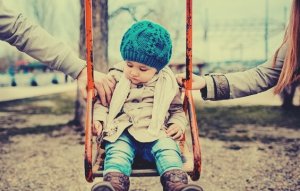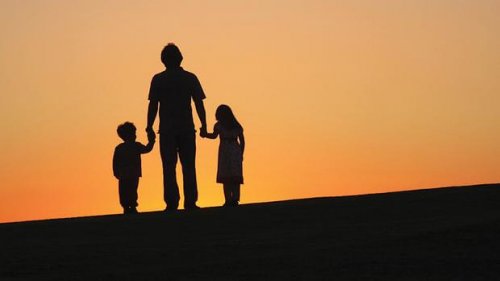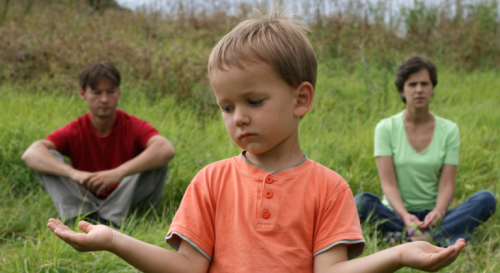The Experiences of Children With Divorced Parents

Many parents think that only they are directly affected by their separation. However, this isn’t true when there are children involved. Though people might not be paying attention, little children also suffer from divorce: the arguments, the misunderstandings, and everything else that comes from a break-up. Many children don’t know how to handle having divorced parents by themselves. Also, it’s normal for them to have a lot of doubts and need someone who can clear them up with patience and understanding.
It’s not a coincidence that many children with divorced parents end up having problems in school. Some start to flirt with drugs and alcohol at a very young age or cut off communication with their families. Children suffer just as much or more because they stand by and watch as one of their first examples of a relationship fails.
60% of children of divorced parents have to undergo some type of psychological treatment.
The consequences of a divorce depend on the age
A separation doesn’t have the same effect on a 6-year-old as it does on a 2-year-old. The circumstances change and the level of maturity is very different. That’s why the age of the child determines how much or how little she will be affected her parent’s separation. One thing that is important to keep in mind is that these childhood experiences will have an impact later on in life.
A child under two years old doesn’t understand what a divorce or what kind of consequences it has. In spite of that, they know that something isn’t right or at least that something is different. They notice their parent’s emotional changes and if they are absent or not. This absence often translates into feelings of abandonment. The atmosphere that surrounds them doesn’t offer them the security they need, and this could have important psychological consequences.

Children between the ages of 2 and 3 years old are in a delicate stage. They are in the middle of their development. If the separation greatly affects the child, the consequence could be some kind of developmental delay. It could be a delay in developing certain motor-skills, difficulties with language or issues with potty training. At this age, children really understand what a divorce means, they just know that they want their parents to stay together. That idea turns into a dream for some children.
If the child is between the ages of 3 and 5 they already know – or they have a feeling, at least – what a divorce is and what it means. As a consequence, they will ask a lot of questions. The problem here is if, in their eagerness to find answers, they end up with lies. These are answers that don’t quite make sense and actually enhance the feeling that their world has become an unsafe place. Among the fears that could become heightened is the fear of being alone, or the fear that one of their parents will abandon them. That’s why some children become possessive with one or both of their parents.
Children might react to the possibility of divorce with anger, sadness, or rage. That leads us to understand that they are also affected.
Children between 6 and 12 years of age are much more empathetic, and can even correctly imagine themselves in their parent’s shoes. That being said, it’s not uncommon that they continue to hope that they will stay together. Adults do it all the time, so why wouldn’t a child?

Nevertheless, we must be careful at this age because this kind of a disappointment (understanding that their parents won’t stay together) can have a significant emotional impact. The realization that their dream won’t come true can actually have a bigger impact than the separation itself. Thinking that a situation is temporary is very different from thinking of it as something permanent. The changes that happen might be the same, the emotional impact won’t be.
In this sense, we have to remember that a child at this age, no matter how mature he is, is very far from finishing his emotional development. There are processes that he won’t understand, like how two people who love each other decide not to be together. This feeling of living in a world governed by complex rules that he doesn’t understand can overwhelm him.
At this age, children can develop “confrontation strategies” (among others): children might “unlearn” emotional abilities that they already had, or put on a brave face while hiding deep fear and pain. In the case of the latter, they learn not to express their feelings, which will affect them in their adult life.
Divorced parents and their communication with their children
As we have seen, separations have different effects depending on the age of the child. That is why, even though we might feel broken and unwilling at the moment, it is important to listen to children’s doubts and concerns. We must communicate with them and let them know that no matter what kind of changes are happening, we love them and they can count on us.
On the other hand, keep in mind that children sometimes blame themselves for the separation. It’s possible that they think their behavior is what pushed their parents to get divorced. Parents have to talk to their children and make them understand that they aren’t responsible for or guilty of what is happening.
That’s why it is very important to be clear with the children about what is happening. It doesn’t do any good to try and hide what is happening because we think that they won’t understand the situation. Children understand much more than we (parents, especially) think and they need to know what is happening. Therefore we must be clear, direct, honest, and speak to them in an age-appropriate way so they feel loved.
Many divorced parents try to pit the child against the other parent, which is very painful and harmful.
Many couples focus only on themselves and forget about the feelings that their children might be experiencing. That makes the children feel abandoned and unappreciated. Nevertheless, we can’t avoid talking to them about something so important. Because, though we might not see it, they could be developing a wound that will only get worse over the years if left unattended.
This text is provided for informational purposes only and does not replace consultation with a professional. If in doubt, consult your specialist.








